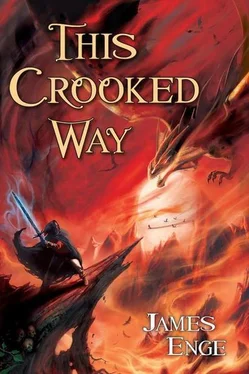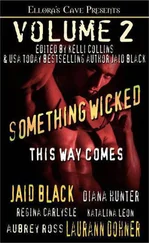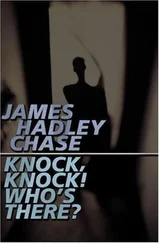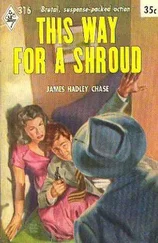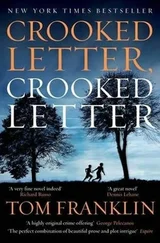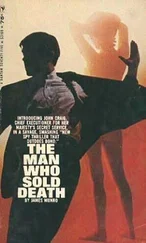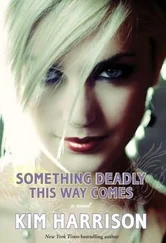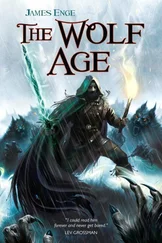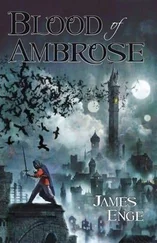"Who rides to the east?" he demanded.
"Arens," said one of the other pair, and, "Teck," said his partner. Marmon looked them over without enthusiasm.
"Who rides to the west?" Marmon asked eventually.
"Liskin!"
"Roble."
Marmon stepped over and eyed both of us. "Liskin, you seem to have a scratch on your shield," he said, and I'd swear the old pimp was smiling.
"Yes, sir. Roble-"
"I'm not your mother, Liskin," said Marmon sharply, and Liskin shut up.
Marmon stood back and spoke to us all. "Arens and Teck, you're fresh from a month off, so I'll just caution you not to play hero. It's one thing when you're boasting in the tavern; it's another thing when you're out there in the woods. Remember: if you're lost, that's one more for the enemy to feed on. When in doubt, save yourself at least; bring back the bodies if you can.
"More specifically, watch where you step. You'll be riding past the Bargainer village, and they've been setting man-traps all along the road and baiting them with real people. Take a long look at everything, especially the ground, confer with each other, and, when in doubt, save yourselves. Go ahead and saddle up."
They left and Marmon turned to us. Again, he was almost smiling as he looked at Liskin's shield. "You two are new partners," he said, "and something tells me you're not going to get along. That's fine with me; it's fine with the Four Barons. You don't have to like each other. But do your job. That's all." He waved us away.
"Marmon," I asked, "what's the road like between here and Caroc?"
"Nothing unusual. Some older children staying out late-just walking in the woods, Mother,' you know. That's about it. Get on the road."
I turned away with Liskin and ran toward the stables. The sun had almost set.
"He didn't tell us not to be heroes," Liskin complained.
"I guess he forgot," I guessed.
It was twilight when Liskin and I rode out of the courtyard of Rendel's Castle and down the main road through Rendel's Town. Liskin and I were both blowing on hillconches as we rode, and off to the east we could hear Arens and Teck doing the same. We made quite a racket between us; there can't have been a person in castle or town who didn't hear us. That, of course, was the idea.
We rode on to the stretch of gravel road at the edge of town, then reined in and turned. Liskin blew another blast on his hillconch, and then I broke the law.
"By the authority of the Four Barons," I shouted, "Masters of Caroc, Rendel, Etain, and Bleisian (castles and towns and lands between), I declare the limit of the law. From town to town, through all the woods, from northern hill to southern plain, I say the law has vanished with the light and will return only with the sun. Until that time, those who enter the woods or walk the Road are guilty of their own suffering and loss, even to their deaths. Let their souls be cursed and their names be forgotten. I declare all this in the name of the Master of Rendel's Castle (here unspoken) and my own, Roble of the Riders."
Liskin blew a final blast on his hillconch and I shouted, "Naeli!" Liskin looked at me in surprise (for this was not part of the rite as he knew it), but he didn't say anything. We rode over a small wooden bridge that arched over a narrow stream and galloped down the road into the lawless woods.
The Riders began as a guild of gravediggers, and in a way that's what we still are. Our primary duty is to collect the dead bodies that accumulate along the road during the lawless hours. Equally important is to collect "strays"people travelling, ignorant, on the road or lost in the woods. These we conduct to a place where law prevails. Finally, there are those who go beyond the law by choice: to kill or rob along the road during the lawless hours. These, too, we bring out of the woods. If they don't resist, then all's well. They have, after all, committed no crime, no matter what they have done. If they resist, we bring them anyway; if necessary, we kill them and bring the bodies out.
That's the one law the Riders carry with them through the lawless hours: bring the bodies out. For every body left in the woods after dark became the subject and sustenance of our enemy, the Boneless One, the Whisperer in the Woods.
That was why the Four Barons had long ago declared the woods and the road through them to be beyond the law after dark: to prevent people from straying there. Those who didn't fear the Enemy, whom they had never seen, would be held back by fear of their fellow man, whom they knew all too well.
It had been a good idea, I'd always thought-perhaps the only thing that could have kept Four Castles alive across the centuries. But it was an idea, some were beginning to suspect, that was doomed to failure. Because there are always outsiders who stumble into the woods without suspecting what dwells there. Because many who should know better simply do not do what is best for them. Because there will always be a few who say to themselves, I won't be killed; I will kill. (And if they're right they leave a body in the woods, and if they're wrong they leave a body in the woods. Either way the Enemy, the Boneless One, gets what it needs.) And, finally, because of the Bargainers, who grow more numerous every year.

The first trap was on the road itself. It looked like a woman in a white dress being dragged off the road by three men with the narrow filed teeth of Bargainers. Glancing over at Liskin, I saw he had drawn his sword and was preparing for a heroic charge. I whacked him across the visor and said, "It's a trap!" He gaped at me in surprise.
At the sound of my voice the "woman" turned toward us. Her hair and skin were as dark as mine; her nose was as high arched and delicate as my mother's had been. Her voice was ragged with desperation as she cried out, "Help me! Help me! Why won't you help me?"
I should know better by now, but it got to me. It always got to me. Alev, in contrast, was pretty callous and could even make conversation with the traps until they vanished in (I guess) frustration.
"Go to hell," I muttered desperately; it was the best I could do, usually.
"Help me!" she screamed. "Help me! Why won't you help me?"
"Shut up," I muttered. "You're not real."
It went on for a while longer until the Enemy gave up and the illusionbait disappeared. Left behind (because it was real, not illusion) was an immense man-trap-or horse-trap, really, since it was made to catch our horses as we gallopped to the rescue. I dismounted and went forward to move the thing out of the way and break it with my truncheon. Liskin remained on his horse as lookout, which was in accordance with the Rules and (for once) good sense besides.
"Be careful!" he called to me as I hustled the shattered trap over to the side of the road. "There's sure to be a Bargainer or two nearby in the wood!"
"You think?" I grunted as I hurled the broken metal into the woods. At that moment I was glaring eye-to-eye with a Bargainer crouching in the brush alongside the road. He made no move toward me, nor I to him, but he smiled at me, showing his teeth filed sharp as needles.
My irony had been lost on Liskin. "Of course!" he said. "There had to be someone on hand to attack us and haul the bodies into the wood!"
"I've learned a lot from riding with you, Liskin," I remarked, backing carefully toward my mount. I could not see any companions to my Bargainer out there. Possibly he was alone. If so, he could be killed and his body hauled out of the woods, which was a good thing, in theory. In practice, it was a little early in the night to start collecting corpses; no god knew how many we would be hauling by the end of the night. It would be extremely bad if we had to stop before dawn and burn some bodies on the road. Also, there was the possibility that the Bargainer I saw was not alone-that he was just another form of bait. I weighed the alternatives, reflected that it was Liskin, not Alev, who was watching my back, and decided to let the Bargainer go.
Читать дальше
